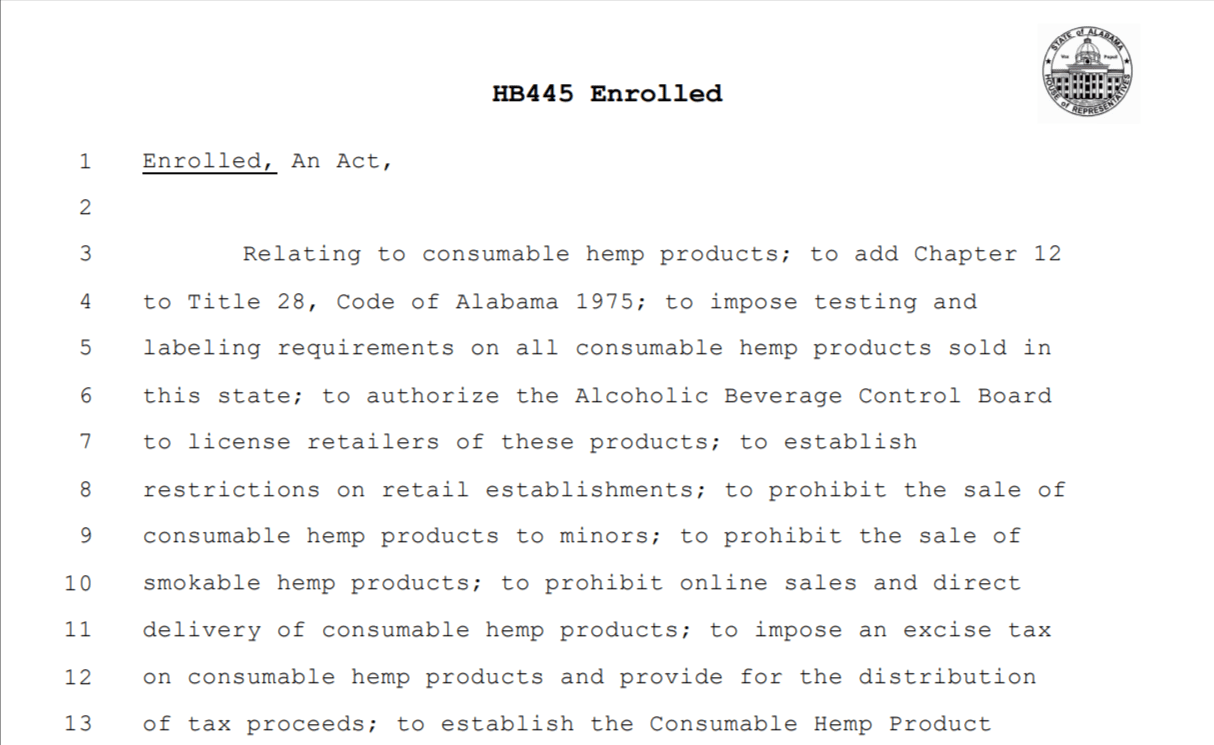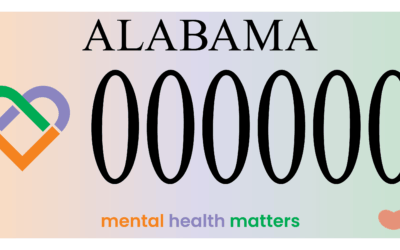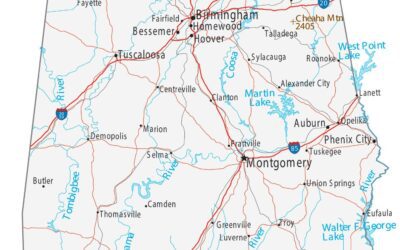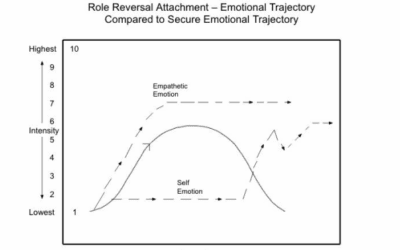As Alabama continues to navigate complex cannabis legislation, residents face significant changes that require careful understanding and preparation. Recent laws have reshaped the hemp industry in Alabama, with House Bill 445 taking effect on July 1, 2025, completely banning all smokable/inhalable hemp products and imposing strict regulations on remaining consumable products. This comprehensive guide will help you understand your rights, the risks involved, and evidence-based alternatives for managing conditions previously treated with marijuana.
Understanding Alabama’s Current Cannabis Legal Landscape
The Reality of Alabama’s Cannabis Laws in 2025
Alabama maintains some of the strictest marijuana laws in the nation, with recreational use remaining completely illegal as of 2025. While the state passed medical marijuana legislation in 2021 through the Darren Wesley ‘Ato’ Hall Compassion Act, implementation has been significantly delayed. As of early 2025, legal medical cannabis sales have not commenced in Alabama due to ongoing court cases blocking the Alabama Medical Cannabis Commission from awarding dispensary licenses.
Recent Changes: House Bill 445 and Its Impact
House Bill 445, which took effect on July 1, 2025, has fundamentally reshaped Alabama’s cannabis landscape. The law:
- Completely bans all smokable and inhalable hemp products
- Limits consumable products to 10 milligrams of THC per individual item and 40 milligrams per package
- Requires vendors to register with Alabama’s Beverage Control Board and pay excise taxes
- Prohibits online sales, direct delivery, drive-through sales, and direct shipments of hemp products
The Alabama Attorney General’s Office has clarified that possession or sale of smokable hemp products as of July 1, 2025, could result in prosecution for a Class C felony.
Understanding Your Rights and Legal Protections
What You Need to Know About Possession
Personal Use Possession: In Alabama, marijuana possession for “personal use only” is classified as a Class A Misdemeanor, punishable by up to one year imprisonment and fines up to $6,000. The law does not provide a specific quantity threshold for what constitutes personal use, leaving interpretation to law enforcement and courts based on individual case circumstances.
Repeat Offenses: A conviction for marijuana possession after a previous non-personal use conviction becomes a Class D felony, punishable by a minimum of one year and one day and a maximum of five years in prison, plus fines up to $7,500.
Non-Personal Use Possession: Possession of any amount of marijuana for reasons other than personal use is a Class C felony, carrying sentences between one to ten years and fines up to $15,000.
Legal Defenses and Protections
When facing possession charges, several potential defenses may be considered, including challenging the legality of the search and seizure process that led to the discovery of marijuana. Under Fourth Amendment protections, evidence obtained through unreasonable searches without warrants or probable cause may be deemed inadmissible.
Medical necessity defenses have limited application given Alabama’s strict laws, though defendants might explore this avenue if possession was directly related to a medical need and no legal alternatives were available.
Critical Risks: The Complex Reality of “Legal” Products in Alabama
The Danger of Previously Legal Products
Many Alabama residents may still possess hemp-derived products that were legally purchased before July 1, 2025. These products are now illegal to possess, regardless of when or where they were purchased. This creates several dangerous scenarios that could result in serious criminal charges.
Scenario 1: Products Purchased Legally in Alabama Before July 1, 2025
The Situation: You purchased delta-8 gummies, hemp flower, or vape cartridges from a licensed Alabama retailer before the ban took effect.
The Legal Reality: As of July 1, 2025, possession of these products is now illegal and could subject you to prosecution for a Class C felony, regardless of when you purchased them legally.
Potential Charges:
- Smokable products: Class C felony (1-10 years prison, up to $15,000 fine)
- Paraphernalia: Class A misdemeanor (up to 1 year jail, $6,000 fine)
- If found during a traffic stop: Additional charges for possession in a vehicle
Real-World Risk: Police officers may not distinguish between products purchased legally before the ban and illegal marijuana. The burden falls on you to prove legitimacy, which may be impossible since possession itself is now illegal.
Scenario 2: Purchasing “Legal” Products from Alabama Stores Post-July 1
The Situation: You see products still being sold in Alabama stores and assume they’re legal under the new regulations.
The Legal Reality: Only consumable products with 10mg THC per item and 40mg per package are legal, and vendors must be licensed. Many products being sold may not comply with these restrictions.
Hidden Dangers:
- Unlicensed vendors: Those caught selling hemp products without a license face potential $20,000 fines, and customers could face possession charges
- Mislabeled products: Items may contain more THC than legally allowed
- Contaminated products: Unregulated products may contain harmful substances
Potential Charges:
- Possession of over-limit products: Class A misdemeanor to Class C felony
- Unknowing purchase from unlicensed vendor: Still results in illegal possession charges
Scenario 3: Interstate Transportation from Legal States
The Situation: You travel to Georgia, Tennessee, or another state where cannabis is legal and bring products back to Alabama.
The Legal Reality: This constitutes drug trafficking under Alabama law, regardless of the product’s legal status in the origin state.
Trafficking Thresholds and Penalties:
- Any amount of marijuana: Federal and state trafficking charges possible
- Over 2.2 pounds: Automatic trafficking charges with minimum 3-year prison sentence
- Concentrate products: Much smaller amounts trigger trafficking charges
- Fines: Start at $25,000 and can reach $500,000
Additional Federal Risks:
- Interstate transport: Federal charges possible even for small amounts
- Border patrol stops: Increased enforcement at state lines
- Asset forfeiture: Vehicles, cash, and property can be seized
Scenario 4: Online Purchases and Shipping
The Situation: You order products online from companies claiming to ship legally to Alabama.
The Legal Reality: Online sales, direct delivery, and direct shipments of consumable hemp products within or into Alabama are strictly prohibited.
Multiple Criminal Exposures:
- Mail fraud: Federal charges for using postal service for illegal activity
- Conspiracy charges: If vendor is operating illegally
- Possession charges: Upon delivery and possession
- Distribution charges: If ordering large quantities
Shipping Risks:
- Package inspection: Postal services and shipping companies may inspect suspicious packages
- Address flagging: Your address could be flagged for future monitoring
- Financial tracking: Credit card and bank records create paper trails
Scenario 5: Gifting or Sharing Products
The Situation: You give previously purchased legal products to friends or family members.
The Legal Reality: This constitutes distribution of controlled substances, a serious felony regardless of whether money changes hands.
Criminal Charges:
- Distribution: Class B felony (2-20 years prison, $30,000 fine)
- If given to minors: Class A felony (10 years to life, $60,000 fine)
- Conspiracy charges: If multiple people are involved
Scenario 6: Medical Use Assumptions
The Situation: You believe products are legal for medical use due to Alabama’s medical marijuana law.
The Legal Reality: Alabama’s medical marijuana program is not operational as of 2025, with no patients registered or products available.
Dangerous Misconceptions:
- No medical protection: Current law provides no protection for marijuana possession
- No registry: No legal way to obtain medical marijuana cards currently
- Doctor recommendations: Cannot legally protect against possession charges
Scenario 7: Workplace and Professional Consequences
The Situation: You’re arrested for possession of previously legal products.
Beyond Criminal Penalties:
- Professional licensing: Medical, legal, teaching, and other professional licenses at risk
- Employment termination: Most employers have zero-tolerance drug policies
- Security clearances: Federal and contractor positions affected
- Student financial aid: Federal aid eligibility compromised
- Housing: Public housing and rental applications affected
Scenario 8: Vehicle Searches and Traffic Stops
The Situation: Police discover hemp products during routine traffic stops.
Legal Complications:
- Probable cause: Product smell or visibility can justify expanded searches
- DUI charges: Possible even without impairment if products detected
- Vehicle impoundment: Car may be seized as evidence
- Passenger charges: Everyone in vehicle could face possession charges
Enhanced Penalties:
- School zones: Additional penalties if stopped near schools
- Repeat offenses: Escalating charges for subsequent violations
- Weapon possession: Additional charges if firearms present
The “Grandfather Clause” Myth
Critical Understanding: There is no “grandfather clause” protecting previously purchased products. The criminal prohibition goes into effect July 1, 2025, making possession or sale of excluded products subject to prosecution as a Class C felony.
Interstate Commerce Confusion
The Legal Reality: While interstate commerce of hemp products through Alabama is allowed (Georgia to Mississippi), this only applies to transportation without stopping or possessing in Alabama.
What This Means:
- Passing through: Products can be transported through Alabama without stopping
- No possession: Cannot possess products while in Alabama, even temporarily
- No consumption: Cannot use products while in Alabama territory
Enforcement Reality
Law Enforcement Challenges:
- Product identification: Officers may not distinguish between legal and illegal products
- Testing delays: Lab results may take weeks while you remain charged
- Prosecutor discretion: Charges may be filed regardless of product legitimacy
Practical Enforcement:
- Increased scrutiny: Law enforcement actively looking for violations
- Public pressure: Community pressure for strict enforcement
- Revenue generation: Fines and forfeitures provide government revenue
Protecting Yourself: Immediate Actions Required
Disposal Recommendations:
- Safely dispose of all previously purchased hemp products immediately
- Contact local law enforcement for safe disposal programs if available
- Remove all paraphernalia including vaporizers, pipes, and storage containers
- Clear digital evidence including purchase records and delivery confirmations
Documentation Protection:
- Destroy receipts from previous legal purchases
- Clear browser history of hemp-related searches and purchases
- Delete delivery apps that may have product purchase history
- Remove social media posts showing or discussing hemp products
If You’re Already Facing Charges
Immediate Legal Steps:
- Remain silent – Do not discuss the case with anyone except your attorney
- Contact a criminal defense attorney immediately
- Preserve evidence of legal purchase if applicable
- Document timeline of when products were purchased versus law changes
Potential Defense Strategies:
- Challenge search and seizure if constitutional violations occurred
- Timing arguments regarding when possession began versus law effective dates
- Product testing to verify actual THC content and compliance
- Entrapment defenses if law enforcement encouraged illegal activity
Additional Consequences
Beyond prison time and fines, a felony drug conviction results in loss of voting rights, firearm ownership restrictions, and significant employment barriers. Defendants convicted of drug trafficking may also face driver’s license suspension of up to six months.
Understanding Penalties and Legal Consequences
Current Penalty Structure
Alabama remains one of only 19 states that still imposes jail time for simple possession of cannabis, with personal-use possession carrying a maximum penalty of one year in jail and/or fines up to $6,000.
Paraphernalia and Related Charges
Sale or possession of paraphernalia is a Class A misdemeanor punishable by up to one year imprisonment and fines up to $6,000. Sale of paraphernalia to a minor three or more years younger than the seller escalates to a Class B felony with sentences of two to twenty years and fines up to $30,000.
Driving Under the Influence
Alabama criminalizes driving under the influence of controlled substances, with some jurisdictions imposing additional per se laws that forbid drivers from operating vehicles with detectable levels of illicit drugs or metabolites above specific thresholds.
Coping with Restricted Access: Evidence-Based Alternatives
The transition away from marijuana use requires comprehensive support and evidence-based alternatives. Fortunately, Alabama offers several innovative treatment options that can effectively address many conditions previously managed with cannabis.
Psychiatric Medication Management
Working with a qualified psychiatrist can provide access to FDA-approved medications that effectively treat many conditions for which people previously used marijuana. Modern psychiatric medications offer several advantages:
Targeted Treatment: Unlike marijuana’s broad effects, prescription medications can target specific neurotransmitter systems responsible for particular symptoms.
Predictable Dosing: Pharmaceutical medications provide consistent, measurable dosing that allows for precise titration and monitoring.
Legal Protection: Prescription medications carry full legal protection and insurance coverage.
Combination Therapy: Psychiatrists can develop sophisticated medication combinations tailored to individual symptom profiles, often including:
- Antidepressants for mood regulation and anxiety
- Anxiolytics for acute anxiety management
- Mood stabilizers for bipolar conditions
- Sleep medications for insomnia
- Pain management medications for chronic pain conditions
Innovative Ketamine Therapy
Southern Ketamine and Wellness, with locations in Birmingham and Auburn, offers ketamine infusion treatments for various mental health and chronic pain issues, especially for patients who have not found relief through standard treatments.
What Ketamine Therapy Offers:
- Rapid relief for mood and pain disorders through carefully monitored IV infusions
- Treatment administered under medical supervision with careful dosing to ensure safety and effectiveness
- Free treatment options for veterans through partnerships with local VA Medical Centers
Conditions Treated:
- Treatment-resistant depression
- Anxiety disorders
- Post-traumatic stress disorder (PTSD)
- Chronic pain conditions
- Obsessive-compulsive disorder (OCD)
The clinic is led by Dr. Harrison Irons, a double board-certified anesthesiologist and pain management physician with extensive training in ketamine therapy.
Advanced Brain-Based Treatments
QEEG Brain Mapping and Neuromodulation
Peak Neuroscience, in partnership with Taproot Therapy Collective in Hoover, Alabama, offers advanced brain technologies including QEEG brain mapping and neurostimulation approaches.
QEEG Brain Mapping Process: The process involves placing a cap with 20 electrodes on the head to measure, analyze, and quantify brainwaves, creating a comprehensive brain map that provides insights into brain functioning.
Neuromodulation Techniques: Clinical-level neurostimulation includes transcranial alternating current stimulation (tACS), transcranial direct current stimulation (tDCS), and transcranial random noise stimulation, which can significantly improve the quality and speed of results.
Applications: These brain-based treatments can help with ADHD, anxiety, depression, trauma, autism spectrum disorders, academic challenges, mood disorders, addictions, sleep disorders, and peak performance optimization.
Revolutionary Therapy Modalities
Brainspotting Therapy
Brainspotting has become one of the most common therapies at Taproot Therapy Collective in Birmingham, often providing powerful and profound results in relatively few sessions.
How Brainspotting Works: Based on the premise that “where you look affects how you feel,” therapists guide clients to focus on specific eye positions (brainspots) while processing traumatic memories or disturbing emotions. This process helps access and release trauma held in deeper, non-verbal brain regions like the limbic system and brainstem.
Conditions Effectively Treated:
- Complex PTSD and trauma
- Anxiety and depression
- Dissociative disorders
- Addiction recovery
- Performance issues and creative blocks
All adult therapists at Taproot Therapy Collective have completed certified Brainspotting training, with many completing advanced Phase 2 training.
Somatic Experiencing
Taproot Therapy Collective integrates Somatic Experiencing with other modalities for comprehensive trauma healing. This body-based approach recognizes that trauma becomes trapped in the nervous system and uses gentle techniques to help the body release stored traumatic activation.
Key Benefits:
- Helps regulate the nervous system
- Addresses trauma stored in the body
- Promotes natural healing responses
- Complements other therapeutic approaches
Lifespan Integration
Lifespan Integration is offered at Taproot Therapy Collective as part of their comprehensive trauma treatment approach. This therapy helps integrate traumatic memories by creating new neural pathways that connect past experiences with present-day resources and wisdom.
Emotional Transformation Therapy (ETT)
While specific details about ETT providers in Alabama weren’t found in the search results, this approach combines elements of cognitive therapy, Gestalt therapy, and energy psychology to create rapid emotional shifts and healing.
Additional Therapeutic Modalities
Taproot Therapy Collective also provides EMDR, Jungian therapy, Internal Family Systems (IFS), meditation, and mindfulness-based approaches for treating trauma, anxiety, depression, and PTSD.
Making the Transition: Practical Steps Forward
Immediate Steps for Legal Compliance
- Dispose of illegal substances safely – Contact local law enforcement for safe disposal options
- Remove paraphernalia – Eliminate any drug-related items from your possession
- Understand your rights – Know what to do if approached by law enforcement
- Seek legal counsel if facing charges
Building a Support Network
- Connect with mental health professionals who understand cannabis transition
- Join support groups for individuals making similar transitions
- Engage family and friends who can provide accountability and support
- Consider peer support specialists with lived experience
Accessing Alternative Treatments
- Consult with a psychiatrist to explore medication options
- Research innovative therapies like ketamine treatment or brainspotting
- Consider brain-based approaches such as QEEG mapping and neurostimulation
- Explore holistic modalities including somatic therapies
Long-term Recovery Planning
- Develop coping strategies for stress and symptom management
- Create a crisis plan for managing difficult symptoms
- Build healthy lifestyle habits including exercise, nutrition, and sleep hygiene
- Establish ongoing therapeutic relationships for continued support
Insurance and Access Considerations
Many of these alternative treatments may be covered by insurance when provided by licensed mental health professionals. At Taproot Therapy Collective, they can help verify insurance benefits and offer flexible payment options including sliding scale fees to ensure treatments are accessible.
For ketamine therapy, Southern Ketamine and Wellness offers financing options and special programs for veterans.
Moving Forward with Hope and Healing
While Alabama’s cannabis restrictions may feel overwhelming, the state offers access to cutting-edge, evidence-based treatments that can provide effective relief for many conditions. The key is working with qualified professionals who understand both the challenges of transitioning away from marijuana use and the full spectrum of alternative treatments available.
Remember that healing is possible, legal alternatives exist, and professional support is available throughout Alabama. Whether through innovative ketamine therapy, advanced brain-based treatments, or revolutionary therapeutic modalities like brainspotting and somatic experiencing, effective treatment options can help you maintain wellness while staying within legal boundaries.
The journey toward wellness doesn’t end with cannabis restrictions—it simply takes a different, potentially more effective path forward. By understanding your legal rights, accessing appropriate professional care, and exploring evidence-based alternatives, you can continue working toward optimal mental health and well-being in full compliance with Alabama law.
This information is provided for educational purposes only and should not be considered legal or medical advice. Always consult with qualified legal and healthcare professionals for guidance specific to your situation.



























0 Comments